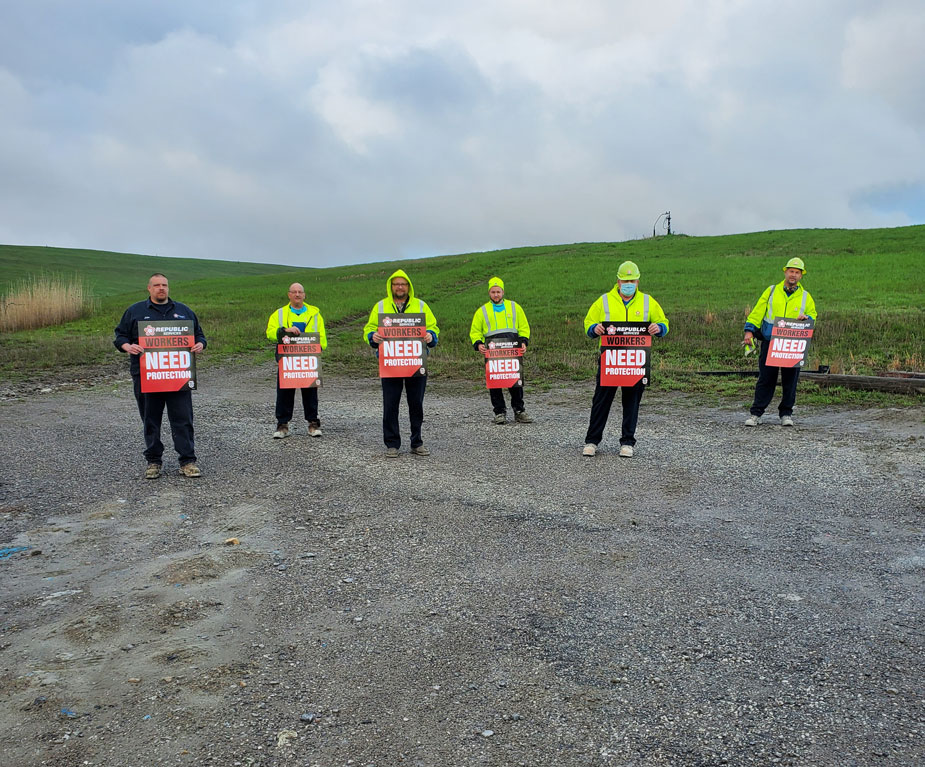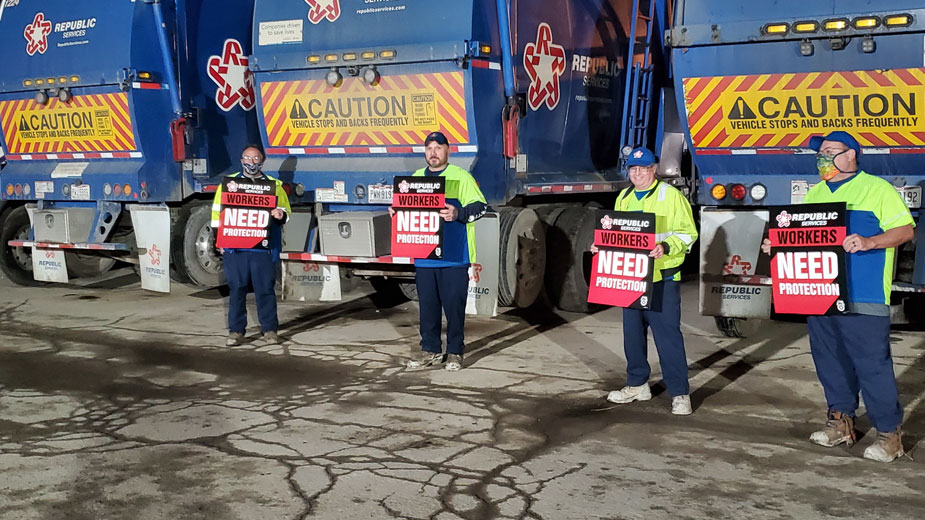Teamsters Demand Republic Services Improve Safety Conditions
YOUNGSTOWN, Ohio — Members of Teamsters Local 377 are demanding Republic Services provide personal protective equipment and better workplace conditions during the coronavirus pandemic, including revised attendance and paid sick leave policies.
To drive home the message, workers from the three Republic Services locations in the Youngstown area held a protest Friday morning, joining protests in Massachusetts, Georgia, Los Angeles and the Bay Area. Some 800 workers in total protested in those areas, says Chuck Stiles, director of the Teamsters Solid Waste Division, which represents about 32,000 members.
Republic Services employs some 70 members of the Teamsters in the Youngstown area, including two hauling stations in Youngstown and the landfill in Lowellville. The protest was finished before the planned 11 a.m. stop time so employees could get back to work.
The members contend that the coronavirus mitigation efforts and distribution of personal protective equipment “does not match a lot of their competitors,” Stiles says. Other companies that Teamsters work for have committed to keep employees working so they can maintain their health care, he says.
“We cannot get that type of commitment from a company that had over $3 billion in profits last year,” Stiles says.
Republic Services, Phoenix, Ariz., is the second-largest waste management company in the U.S. behind Waste Management, based in Houston. In the fourth quarter of 2019, the company reported $2.58 billion in revenue, up 2% year-over-year. Net income was $289.3 million, down 3.9% from the same period in 2018. Bill Gates is the largest stakeholder of the company.
Personal protective equipment is among the top concerns of workers, particularly for those who work at the landfill, Stiles says. In addition to respirator masks, workers have requested puncture-resistant gloves, stronger safety boots, face shields and Tyvek suits.
“We don’t think they have the proper equipment they need to have for this pandemic going on,” he says.
Early in the pandemic, Teamsters in Atlanta had to purchase masks to distribute to the workers there. The union was not reimbursed for the purchase, he says.
“We did it on our own,” Stiles says. “We got them out before the company started supplying masks.”
Even then, distribution of personal protective equipment “is sporadic,” he says. At one location, a shipment of 60 face masks and 30 small bottles of hand sanitizer was delivered for 140 workers, he says. “There’s never enough to go around.”

While face masks are fine, face shields would be better for workers at the landfill, he says. While workers drive bulldozers, the shields would help to deflect garbage potentially contaminated by the coronavirus that is kicked up into their face, he says.
Tyvek suits would be especially beneficial to workers “cleaning behind the blade” after their routes. At the end of the day, workers must clean the excess garbage and liquids that accumulate behind the plunger part of the truck that compacts the garbage from stop to stop. The contents can include hazardous materials, such as syringes, diapers and even some biohazard bags.
“You literally have to get inside the body of the truck with a shovel or brush and clean out the truck” Stiles says.
In an emailed response to a request for a statement, Republic Services states the health and safety of its employees is “our top priority,” and is at the forefront of every decision it makes.
“We are continuing to take enhanced measures to help ensure the well-being of our employees and communities in addition to closely following guidance from the CDC, state and local public health agencies,” the company states. “We are also continuing to work closely with public health experts and other advisors and will continue to adhere to OSHA guidelines regarding the safe handling of waste and recycling.
“We have instructed employees on personal hygiene protocol for COVID-19 and provided necessary personal protective equipment (PPE) for their roles,” the company continues. “All of our facilities and equipment are on an enhanced cleaning schedule, with cleanings scheduled multiple times per day. We also are conducting deep cleaning and disinfection of any operating location, including trucks and heavy equipment, that may have been exposed to COVID-19.”
Masks are provided to be used voluntarily or as directed by local mandates, the company states.
Stiles counters that statement, contending the equipment isn’t deep cleaned daily and break rooms aren’t deep cleaned more than once weekly.
Though he doesn’t have specific numbers, Stiles says some Teamsters members have contracted COVID-19, including two cases in Atlanta. At the time of one of the cases, there had been no plan of action on COVID-19 from Republic Services, he alleges, and workers were being dispatched out of small rooms. One operation had to shut down for the bulk of a day for cleaning.
The company contends that in March, it made “extensive changes” to all of its locations to “ensure proper social distancing for all our employees,” including adjusting procedures to limit the number of employees interacting with each other when they crew in and crew out at the beginning and end of the day.
In addition to personal protective equipment, the union is requesting changes to the company’s existing sick leave policy.
Under the current policy, workers receive 10 days of sick leave to care for themselves or their loved ones. For anyone who goes over those 10 days, they have to use any personal paid-time off days to make up the difference, Stiles says.
“This is the fifth most dangerous job in America before the pandemic,” he said “We want to take care of our members, their families, our communities and our customers.
“If they’re out 15 days, pay them for the 15 days. That’s what the other companies are doing,” he continues.
In a March 16 letter to the CEOs of four of the largest waste companies in the U.S., including Republic Services, Stiles outlines the union’s requests on behalf of its membership. The union alleges Republic Services is the only company to not respond to the letter. Click here to read the letter in full.
The union also published a list of waste industry best practices amid COVID-19.
Requested changes to the sick leave policy include:
- Changing the attendance policy to excuse all union employee absences for the foreseeable future, for those who may need to take time off to care for a sick family member exposed to COVID-19 or to care for children attending schools or daycares that have closed due to the virus.
- Provide up to 14 days of paid leave for employees exposed or quarantined due to COVID-19 or for those who must care for a sick family member who is exposed or quarantined because of COVID-19.
- Provide paid leave, without impact on employees’ leave balances and benefits for employees who are unable to work due to public health or required quarantine.
- If layoffs are being considered due to reduce business, consider accepting volunteers for layoffs first before mandatory layoff by seniority.
- Grant employees additional paid time off for a finite period of time during the COVID-19 epidemic to be taken due to quarantine, care for a sick family member, care for a child during school closing, offset time lost due to reduced hours or layoff scenarios.
- Set up a rapid response system to share communications with employees.
In its response, Republic Services says employees receive 10 days of paid time off to care for themselves or their families in the event of a COVID-19 diagnosis.
“This is in addition to the paid time off that employees already receive,” the company states. “We want our employees to know that they don’t have to worry about being paid or how they would care for a sick family member if a loved one were to become ill. Furthermore, we have revised our medical plans to cover COVID related out-of-pocket costs and are allowing our employees to enroll family members in our benefit plans due to job losses.”
Pictured: Members of the Teamsters Local 377 protested the working conditions at Republic Services.
Copyright 2024 The Business Journal, Youngstown, Ohio.



